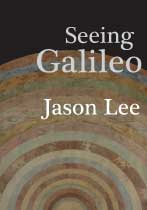 There are two questions I am frequently asked, and these concern: (1) whether or not Gylphi publishes texts concerned with periods of time outside the twentieth and twenty-first centuries; and, (2) if Gylphi publishes fiction.
There are two questions I am frequently asked, and these concern: (1) whether or not Gylphi publishes texts concerned with periods of time outside the twentieth and twenty-first centuries; and, (2) if Gylphi publishes fiction.
The answer to these two questions is succinctly provided by Seeing Galileo; which is the most recent publication due to be released by Gylphi in a couple of weeks.
It is as the name suggests about Galileo, it is also about Milton and a possible meeting between the two men. Placing the subject matter in the seventeenth century, but at the same time because of the way in which the text has been written – as a mix of biography, criticism, photography and poetry – it draws the past into the present.
The frescoes are an example of this; they are worn down by time and appear in some of the excellent photographs taken by Rebecca Griffith in Florence and Pisa. These photographs, along with many others, complement the textual winks at modernism, from Joyce to Beckett, which act as thorn bushes of the more recent past that cut and scrape our interpretations of history as it passes through them.
I am hopeful that the book will test some of the boundaries and preconceptions of what an academic press should publish. Demonstrating the need of presses such as Gylphi to nurture and support academics across a broad range of writing projects that at times fall outside the traditional forms of publication: monograph/textbook/essays/reference.
Rather than a research text, Seeing Galileo is a book written for a wide audience interested in stimulating their intellect. It performs this by exploring what it is possible for the reading experience to gain through a merging of critical, poetic, dramatic and visual forms. It is a book to take time out with that also contains a depth of critical investigation that you would expect from an academic press.
At the moment, we don’t know how readers will respond to Seeing Galileo. As with the Arts Future Book project, discussed in my last post, it pushes the boundaries. But this is the everyday role of a publisher such as Gylphi, since it is focused on areas of research still in their formative years.
In order to encourage you to embrace the work that Gylphi is currently publishing, I would like to offer you a gift in return for reading these posts – a 10% discount code valid until 31 December 2010. Simply enter the code PHD2PUB in the online shopping cart to be found on the product pages. (Currently available to buy and preorder: Seeing Galileo and the Journal of British and Irish Innovative Poetry)
Finally, I’d like to say thank you to Charlotte Frost for inviting me to submit this series of posts to PhD2Published, and to wish the website every success for the future. As those of you will know, who read last week’s post and who have been reading Charlotte’s own posts, Gylphi will be working with her on the Arts Future Book series and also her own book: Art History Online: Mailing Lists, Digital Forums and the Future of Criticism.
To find out more about Gylphi and future projects see: http://www.gylphi.co.uk







Leave a reply